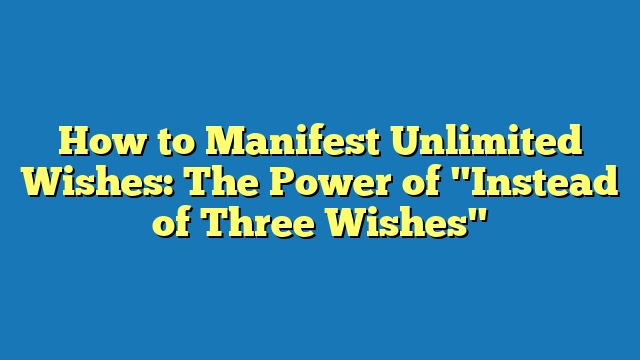Instead of Three Wishes, a revolutionary concept in the world of wishes, grants an inexhaustible supply of wishes to its users rather than limiting them to just three. For example, imagine if Aladdin’s lamp offered an endless number of wishes instead of confining him to only three.
This concept offers immense power and flexibility, allowing us to pursue our desires without constraint and explore the boundless possibilities of the world. Its historical roots can be traced back to ancient folklore, where stories often depicted characters receiving more than three wishes, paving the way for this groundbreaking idea.
As we delve into the intricacies of this concept, we will uncover the profound implications, benefits, and challenges associated with an unlimited supply of wishes. This exploration will provide invaluable insights for fostering a nuanced understanding of the transformative power of “Instead of Three Wishes”.
Instead of Three Wishes
The concept of “instead of three wishes” introduces transformative dimensions to the realm of desires, warranting exploration of its essential aspects.
- Unlimited Potential: Unbridled wishes, boundless possibilities.
- Flexibility: Adaptable to evolving aspirations, unrestrained by limitations.
- Exploration: Uncharted territories of desires, unhindered by constraints.
- Empowerment: Control over one’s destiny, shaping reality without limits.
- Responsibility: Weighty implications of unlimited wishes, ethical considerations.
- Historical Roots: Ancient folklore, tales of wishes beyond the traditional three.
- Consequences: Unintended outcomes, potential paradoxes, ripple effects.
- Paradox of Choice: Overwhelming options, decision-making complexities.
These aspects intertwine, creating a complex tapestry of implications. Unlimited potential brings liberation yet demands responsible stewardship. Exploration fosters growth but may lead to uncharted consequences. The paradox of choice presents a labyrinth of decisions, while historical roots ground the concept in timeless human aspirations. Ultimately, understanding these aspects deepens our comprehension of the transformative power and complexities inherent in the notion of “instead of three wishes.”
Unlimited Potential
The concept of “instead of three wishes” is inextricably linked to the notion of unlimited potential, where wishes are no longer constrained by the limitations of a finite number. This unbridled power grants individuals the freedom to pursue their desires without restraint, opening up boundless possibilities for personal growth, societal advancement, and the exploration of uncharted territories.
Real-life examples abound of individuals who have harnessed the transformative power of unlimited wishes. Take, for instance, the tale of the scientist who wished for an inexhaustible source of knowledge, leading to groundbreaking discoveries that revolutionized scientific understanding. Or consider the artist who wished for boundless inspiration, resulting in the creation of masterpieces that continue to inspire generations.
Understanding the connection between unlimited potential and “instead of three wishes” is crucial for realizing its practical applications. By embracing the limitless nature of this concept, we can transcend the constraints of traditional thinking and unlock new avenues for innovation, problem-solving, and personal fulfillment. This understanding empowers us to envision a world where aspirations are no longer bound by the limits of three wishes but soar to unimaginable heights.
Flexibility
Within the paradigm of “instead of three wishes,” flexibility emerges as a cornerstone, allowing for the seamless adaptation to evolving aspirations and boundless exploration. Unlike the rigidity of a finite number of wishes, this concept embraces fluidity, empowering individuals to navigate the ever-changing landscape of their desires and ambitions.
- Adaptable to Changing Circumstances: Flexibility ensures that wishes can be tailored to unforeseen circumstances, enabling individuals to respond effectively to life’s twists and turns. It allows for the modification and refinement of wishes, ensuring alignment with evolving priorities and emerging opportunities.
- Unrestrained Exploration: The absence of limitations encourages experimentation and the pursuit of unconventional desires. Individuals are liberated to venture beyond traditional boundaries, pushing the limits of their imagination and discovering new dimensions of fulfillment.
- Growth and Evolution: Flexibility fosters personal growth by accommodating the natural evolution of aspirations. As individuals progress, their wishes may change and expand, and the concept of “instead of three wishes” provides the space for this evolution without constraint.
- Harnessing the Power of Change: Embracing flexibility empowers individuals to harness the transformative power of change. They can embrace new opportunities, adapt to unforeseen circumstances, and shape their reality according to their evolving desires, fostering a dynamic and fulfilling life journey.
The flexibility inherent in “instead of three wishes” empowers individuals to navigate the complexities of life and pursue their aspirations with unwavering determination. It serves as a catalyst for personal transformation, allowing individuals to embrace change, adapt to new circumstances, and continuously redefine their path toward fulfillment.
Exploration
The concept of “instead of three wishes” forges an unbreakable bond with the notion of exploration, opening up uncharted territories of desires and freeing individuals from the confines of limitations. This exploration serves as a driving force behind the transformative power of “instead of three wishes,” enabling individuals to venture beyond the boundaries of conventional aspirations and discover new dimensions of fulfillment.
Real-life examples abound of individuals who have ventured into the uncharted territories of their desires, guided by the boundless nature of “instead of three wishes.” Consider the explorer who yearned to unravel the mysteries of uncharted lands, leading to groundbreaking discoveries that expanded the frontiers of human knowledge. Or take the artist who sought to transcend the limitations of traditional artistic expression, resulting in the creation of innovative and thought-provoking works that continue to inspire and challenge.
Understanding the connection between exploration and “instead of three wishes” holds immense practical significance. By embracing the spirit of exploration, individuals can cast aside the constraints of conventional thinking and delve into the depths of their desires. This understanding empowers them to forge new paths, push boundaries, and discover hidden potential within themselves and the world around them. The limitless nature of “instead of three wishes” serves as a catalyst for personal growth, societal advancement, and the creation of a future unconstrained by the limitations of the past.
Empowerment
The concept of “instead of three wishes” is deeply intertwined with the notion of empowerment, granting individuals unparalleled control over their destiny and the ability to shape reality according to their desires. This empowerment emerges as a direct consequence of the limitless nature of “instead of three wishes,” freeing individuals from the constraints of a finite number of wishes and bestowing upon them the power to pursue their aspirations unrestrained.
Real-life examples abound of individuals who have harnessed the transformative power of “instead of three wishes” to empower themselves and shape their reality. Consider the inventor who wished for an inexhaustible source of creativity, leading to groundbreaking innovations that revolutionized industries. Or take the activist who wished for the ability to inspire positive change on a global scale, resulting in the creation of powerful movements that continue to empower marginalized communities.
Understanding the connection between empowerment and “instead of three wishes” holds immense practical significance. By embracing the empowering nature of this concept, individuals can transcend the limitations of traditional thinking and take ownership of their lives. This understanding empowers them to set ambitious goals, pursue their passions with unwavering determination, and create a future that aligns with their deepest desires and values. The limitless nature of “instead of three wishes” serves as a catalyst for personal transformation, societal advancement, and the creation of a world where individuals are empowered to shape their own destiny and shape reality according to their vision.
Responsibility
The concept of “instead of three wishes” is deeply intertwined with the notion of responsibility, imposing weighty implications and ethical considerations upon those who possess the power to make unlimited wishes. This responsibility arises from the immense power that unlimited wishes bestow, demanding careful reflection on the potential consequences of one’s desires and the impact they may have on oneself, others, and the world.
Responsibility becomes a critical component of “instead of three wishes” because it serves as a guiding principle for ethical decision-making. Without a sense of responsibility, the limitless nature of wishes could lead to impulsive or selfish desires, potentially causing harm to individuals or society as a whole. Therefore, individuals must exercise prudence and consider the broader implications of their wishes, ensuring that they align with moral values and contribute positively to the world.
Real-life examples abound of individuals who have grappled with the responsibility inherent in “instead of three wishes.” In the realm of literature, the character of King Midas, granted the power to turn anything he touched into gold, serves as a cautionary tale about the dangers of unchecked desires. His reckless use of his power led to tragic consequences, highlighting the need for responsible wish-making.
Understanding the connection between responsibility and “instead of three wishes” holds immense practical significance. It empowers individuals to make thoughtful and ethical choices, considering the long-term effects of their wishes and their potential impact on the world. This understanding fosters a sense of accountability and encourages individuals to use their unlimited wishes for the greater good, promoting societal well-being and harmony.
Historical Roots
The concept of “instead of three wishes” finds its roots in ancient folklore and tales that depict characters receiving more than the traditional three wishes. These stories have shaped our understanding of unlimited wishes and continue to influence the way we perceive the power of desire.
- Myths and Legends: Ancient myths and legends often feature characters who are granted unlimited wishes or magical powers. These stories explore the potential consequences of unchecked desires and the importance of using power responsibly.
- Folk Tales: Folk tales from around the world tell of individuals who receive multiple wishes or magical objects that grant their every desire. These tales often serve as cautionary reminders about the dangers of greed and the pitfalls of relying on external forces to fulfill one’s dreams.
- Religious Traditions: Some religious traditions also include stories of individuals who are granted unlimited wishes or divine favors. These stories often emphasize the importance of aligning one’s desires with higher spiritual or moral values.
- Philosophical Perspectives: Ancient philosophers have pondered the nature of unlimited wishes and the ethical implications of having one’s every desire fulfilled. Their writings offer valuable insights into the potential benefits and drawbacks of possessing such power.
By examining the historical roots of “instead of three wishes,” we gain a deeper understanding of the cultural, social, and ethical contexts that have shaped our perceptions of unlimited desires. These ancient stories and perspectives continue to inform our contemporary understanding of the concept and provide valuable lessons for navigating the complexities of human wishes and aspirations.
Consequences
The concept of “instead of three wishes” opens up a realm of infinite possibilities, but it also introduces a complex web of potential consequences. Delving into this aspect is crucial to comprehending the true nature and implications of possessing unlimited wishes.
-
The Paradox of Choice
An inexhaustible supply of wishes presents a bewildering array of options, potentially leading to decision paralysis and a sense of overwhelm. Paradoxically, having unlimited choices can hinder one’s ability to make meaningful decisions.
-
Unintended Consequences
Wishes, no matter how well-intentioned, can have unforeseen repercussions. The ripple effects of seemingly simple desires can cascade into unexpected and often undesirable outcomes, disrupting the delicate balance of life.
-
Ethical Dilemmas
“Instead of three wishes” confronts us with profound ethical quandaries. The power to fulfill every desire raises questions about fairness, equality, and the boundaries of personal responsibility.
-
The Illusion of Control
While the concept grants the illusion of absolute control, it is important to remember that even with unlimited wishes, external factors and the interconnectedness of all things can disrupt our best-laid plans.
The complex interplay of these consequences underscores the notion that unlimited wishes are not without their challenges. By acknowledging and understanding these potential pitfalls, we can navigate the complexities of “instead of three wishes” with greater awareness and prudence, ensuring that our desires serve as a force for positive transformation rather than unintended harm.
Paradox of Choice
The concept of “instead of three wishes” introduces an intriguing paradox: an inexhaustible supply of wishes can lead to an overwhelming array of choices, potentially hindering decision-making. This “Paradox of Choice” stems from the fact that with unlimited options, individuals may experience a sense of paralysis and struggle to prioritize their desires or make meaningful decisions.
Consider the real-life example of a person who wins the lottery and suddenly has access to vast financial resources. While the initial excitement may be exhilarating, the overwhelming number of possibilities and investment options can quickly become daunting. This individual may find themselves struggling to make wise financial decisions due to the sheer volume of choices available.
Understanding the connection between the Paradox of Choice and “instead of three wishes” is crucial for navigating this complexity. By acknowledging the potential for decision fatigue and overwhelm, individuals can approach their unlimited wishes with greater awareness and mindfulness. This includes setting clear priorities, seeking external guidance when needed, and breaking down large decisions into smaller, more manageable steps.
In conclusion, the Paradox of Choice is an inherent aspect of “instead of three wishes” that requires careful consideration. By recognizing this potential challenge and adopting strategies to mitigate its effects, individuals can harness the transformative power of unlimited wishes while avoiding the pitfalls of indecision and impulsive choices.
Frequently Asked Questions about “Instead of Three Wishes”
This FAQ section addresses common questions and clarifications regarding the concept of “instead of three wishes,” offering insights to enhance understanding and address potential misconceptions.
Question 1: What exactly is meant by “instead of three wishes”?
Answer: “Instead of three wishes” refers to the idea of possessing an unlimited number of wishes, as opposed to the traditional limitation of three wishes often depicted in folklore and popular culture.
Question 2: How does the concept of “instead of three wishes” differ from traditional wish-granting scenarios?
Answer: Unlike traditional wish-granting scenarios where individuals are typically limited to a specific number of wishes, “instead of three wishes” proposes an inexhaustible supply of wishes, offering greater freedom and potential for wish fulfillment.
Question 3: Are there any limitations or restrictions associated with “instead of three wishes”?
Answer: While the concept of “instead of three wishes” suggests an unlimited number of wishes, it is important to consider potential consequences, ethical implications, and the limitations imposed by reality and the laws of nature.
Question 4: How can individuals navigate the potential challenges and complexities of having unlimited wishes?
Answer: Navigating the complexities of unlimited wishes requires self-awareness, careful consideration of the implications of wishes, and a balanced approach that prioritizes responsible wish-making and ethical decision-making.
Question 5: What are some of the potential benefits and opportunities offered by the concept of “instead of three wishes”?
Answer: “Instead of three wishes” presents opportunities for personal growth, limitless exploration, and the potential to make a significant impact on the world through the fulfillment of meaningful wishes.
Question 6: How does the concept of “instead of three wishes” relate to broader philosophical and ethical discussions?
Answer: The concept of “instead of three wishes” raises profound philosophical and ethical questions about the nature of desire, the limits of human power, and the responsibilities associated with unlimited wish fulfillment.
These FAQs provide a glimpse into the multifaceted nature of “instead of three wishes,” highlighting its potential benefits, challenges, and the need for mindful and responsible use of unlimited wishes. As we delve further into this concept, we will explore practical applications, ethical considerations, and the transformative potential it holds for individuals and society as a whole.
Transition: Join us as we uncover the practical implications and transformative power of “instead of three wishes” in the upcoming sections, where we will delve deeper into real-world applications and thought-provoking discussions.
Tips for Navigating “Instead of Three Wishes”
Having an infinite number of wishes presents unique challenges and opportunities. These tips can help you navigate this concept wisely, maximizing its benefits and minimizing potential drawbacks:
- Prioritize Your Wishes: With unlimited wishes, it’s easy to get carried away. Establish clear priorities to avoid impulsive or frivolous wishes. Consider your long-term goals, values, and what truly matters to you.
- Consider the Consequences: Each wish has potential ripple effects. Think carefully about the broader implications and potential unintended consequences before making a wish.
- Seek External Perspectives: Don’t always rely solely on your own judgment. Consult with trusted friends, family, or experts to gain diverse perspectives and make informed decisions.
- Embrace Responsible Wish-Making: Unlimited wishes come with a responsibility to use them ethically. Avoid wishes that harm others or go against your moral compass.
- Practice Gratitude: Amidst the excitement of unlimited wishes, remember to appreciate what you already have. Gratitude keeps your desires in perspective and fosters contentment.
Remember, the concept of “instead of three wishes” is a powerful tool for personal growth and positive change. By following these tips, you can harness its potential while navigating its complexities responsibly and effectively.
In the concluding section, we will explore the transformative power of “instead of three wishes” and its potential to shape our lives and the world around us.
Conclusion
Our exploration of “instead of three wishes” reveals a concept brimming with transformative potential. Untethered from the limitations of traditional wish-granting scenarios, this idea invites us to envision a world where our desires are boundless and our aspirations know no end. Key insights from our discussion include the following:
- Unlimited Potential: “Instead of three wishes” empowers us to pursue our aspirations without constraint, unlocking new avenues for personal growth and societal advancement.
- Navigating Complexity: While the concept offers immense freedom, it also presents challenges such as the Paradox of Choice and the need for responsible wish-making.
- Ethical Considerations: The power of unlimited wishes demands ethical reflection and a commitment to using our desires for good, ensuring that our choices align with our values and contribute positively to the world.
The concept of “instead of three wishes” stands as a testament to the human capacity for imagination and aspiration. It challenges us to rethink the boundaries of possibility and to embrace the transformative power of our wishes. As we move forward, let us use this newfound understanding to make thoughtful and responsible choices, harnessing the potential of unlimited wishes to create a more fulfilling and meaningful world for ourselves and generations to come.









Tips for Using "Template by Kevin Crafts" Comments for Meaningful Online Discussions